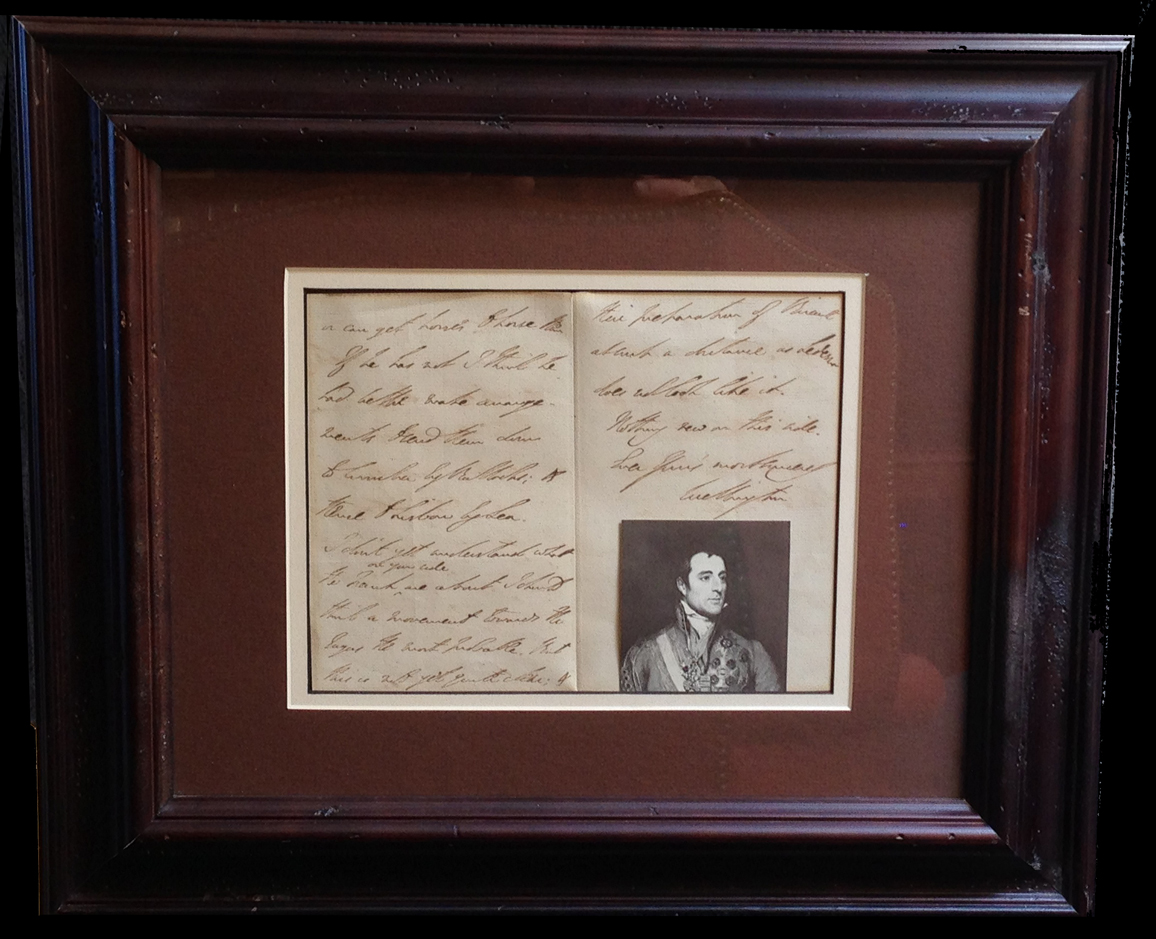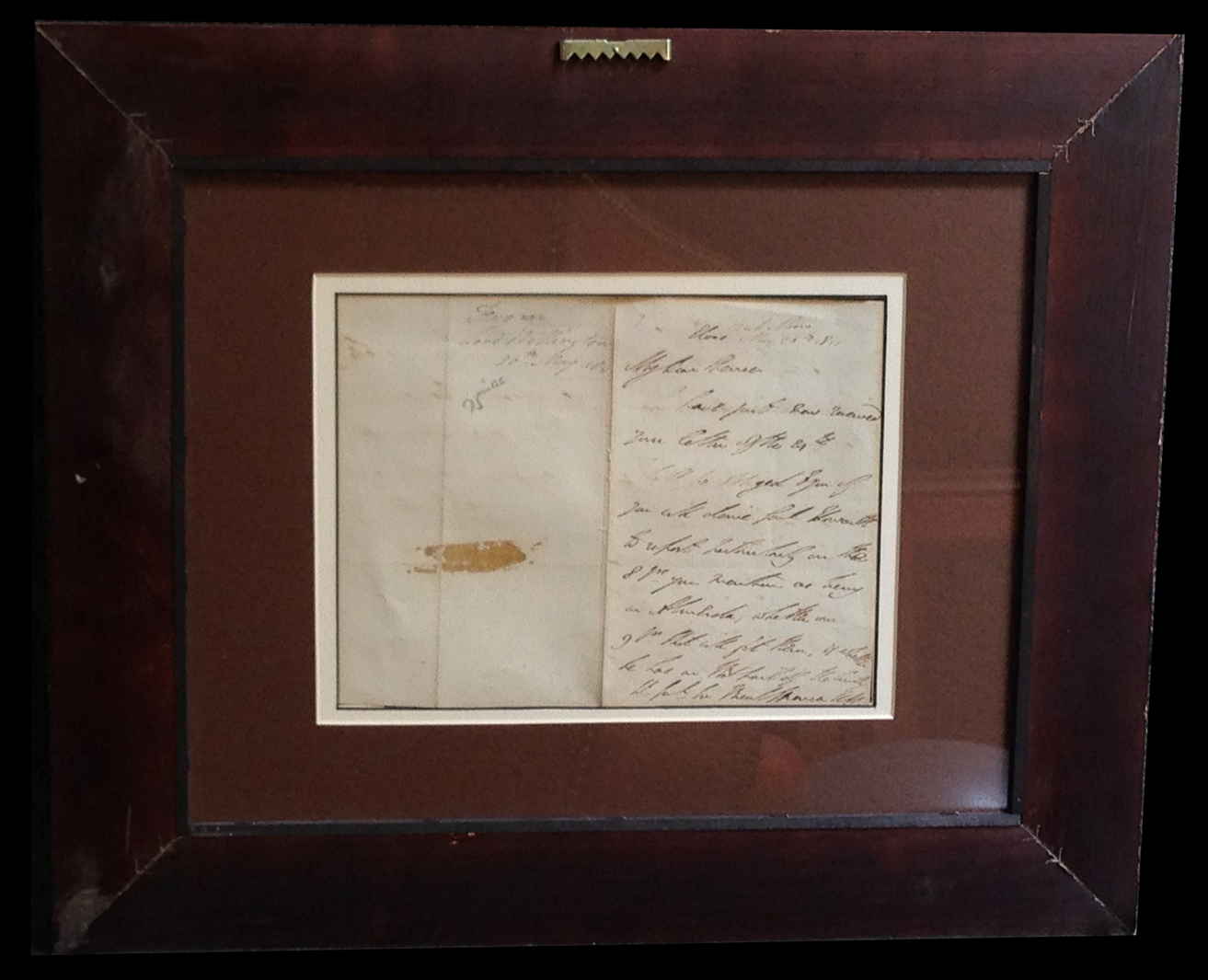Arthur Wellesley
Arthur Wellesley
War-dated Autograph Letter Signed - 1811
Particularly scarce and desirable war-dated Autograph Letter Signed to Lieutenant General Brent Spencer, Wellington’s 1st Infantry Division Commander & his Second in Command during the Peninsular War. Regarding the activities of British troop movements (the 9th Regiment of Foot) and provisioning of horses immediately following the battles for Fuentes de Oñoro and Albuera, leaving the French unable to catch Wellington at a disadvantage and thus leading to a turning point in the war. Single page, written on both sides and framed for back-to-back viewing. Measures 15″ x 18″ in distressed wood frame.
Transcribed at great pains from nearly incomprehensible handwriting:
12 at noon
Elvas [Elvas was the southern fortress that guarded the Portuguese border with Spain; Almeida guarded the northern border.]
May 26th 1811My dear Spencer
I have just now received your letter of the 24th. I shall be obliged to you if you will drive Gen’l Ashworth to report particularly on the 8th you mention as being in Almeida; whether our 9th Foot will fit there; & whether he has in that part of the country or can get horses to horse them.
If he has not I think he had better make arrangements to send them down to Coimbra by bullocks; & thence to Lisbon by Sea.
I don’t yet understand what the French on your side are about. I should think a movement toward the Tagus the most probable. But this is not yet quite clear; & their preparation of B________ at such [or British attack?] a distance as Llerena does not look like it.
Nothing new on this side.Ever yours, most sincerely,
WellingtonLt. Gen’l Sir Brent Spencer KB
[Subsequent and significant letter sent by Wellington to Spencer two weeks later can be found below.]
The victory of the armies of Portugal, Britain and Spain, led by Field Marshall Arthur Wellesley, over Napoleon’s forces in the Peninsular War (1808-1814) led to his creation as 1st Duke of Wellington in 1814. The Peninsular War, part of the Napoleonic Wars, was fought in the Iberian Peninsula—Portugal and Spain—against French troops. The war began when Napoleon agreed with Spain that he would occupy Portugal to close it off to British trade and ended when Wellington’s men captured Toulouse in southern France, followed by Napoleon’s abdication.
Known as “the Iron Duke,” British soldier and statesman Arthur Wellesley (1769-1852), 1st Duke of Wellington, was one of the foremost military and political figures of the nineteenth century. Commander of British troops during the Peninsular War (1808-1814), Wellington is best known for his stunning defeat of Napoleon at Waterloo (1815), thus ending the Napoleonic Wars. Wellesley also became British Prime Minister from 1828 to 1830.
Two weeks after sending the letter above, Wellington dispatched this terse letter to Spencer in regards to the destruction of Almeida:

After the Battle of Fuentes de Oñoro, Spencer was reassigned to an independent command in northern Portugal. Wellesley, now Lord Wellington, was not satisfied that Spencer was up to the responsibilities of second-in-command and he was replaced by Thomas Graham. Miffed, Spencer left Portugal and never returned. Wellington would later write of Spencer, “He was exceedingly puzzle headed. He would talk of the Thames for the Tagus.”


